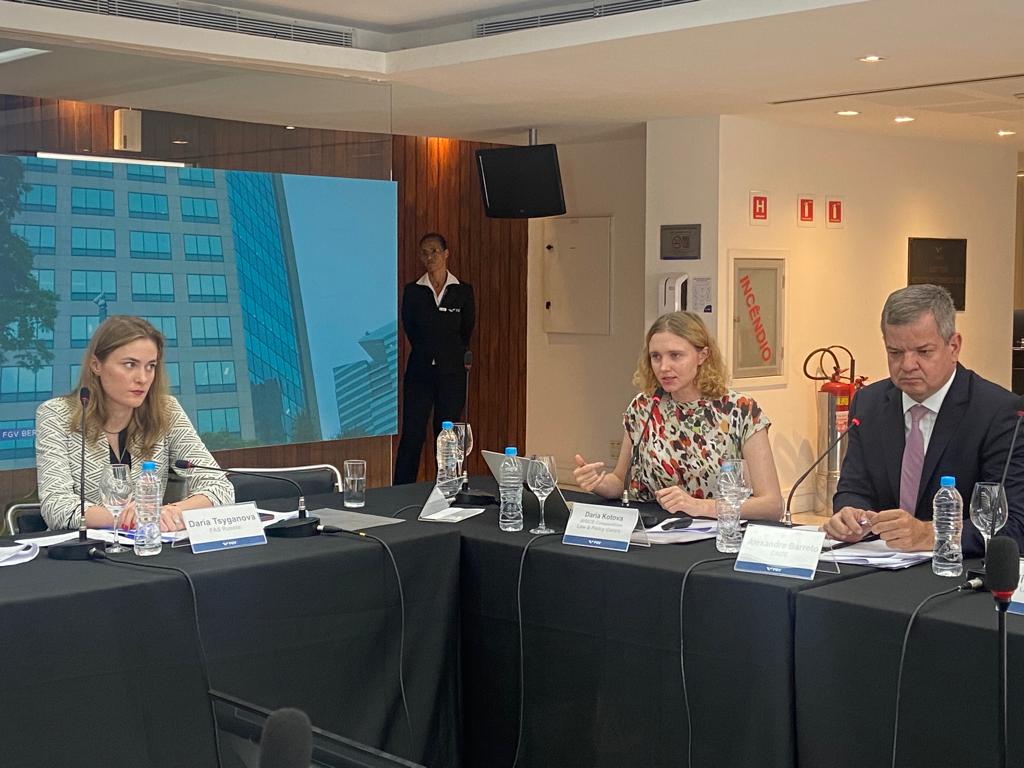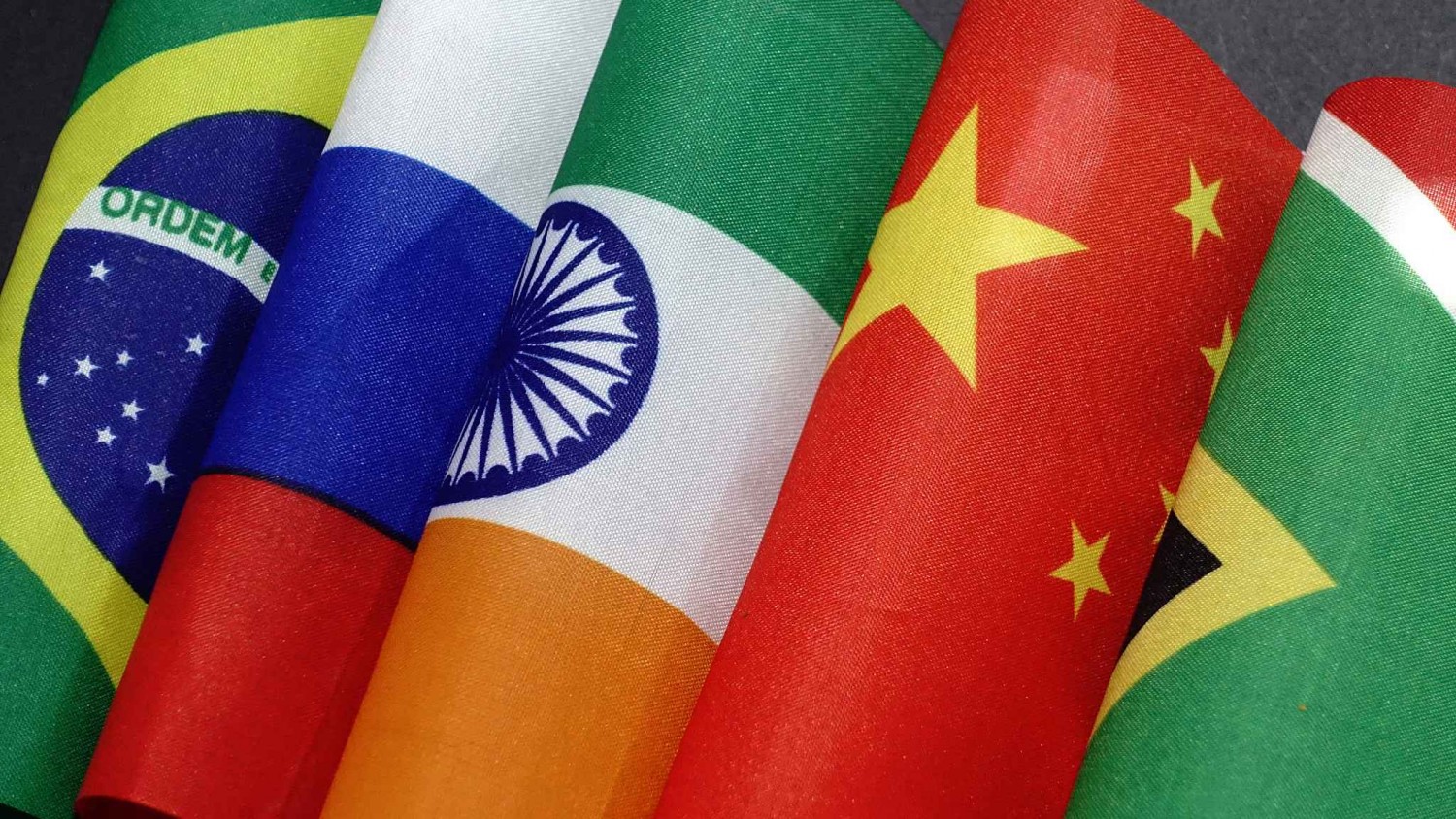On November 16-17, Rio de Janeiro (Brazil) hosted the 2nd BRICS+ Digital Competition Forum organized by the BRICS Competition Law and Policy Centre in cooperation with the FGV Law School and the Brazilian competition authority CADE. The experts of the BRICS Centre delivered a report on the opportunities for strengthening cooperation between competition authorities of the BRICS countries in the field of global mergers.
On the first day of the forum, a Memorandum of Intent was signed between the BRICS Competition Centre and the Brazilian Centre for Technology and Society Development, FGV. The forum also included a meeting of the BRICS Working Group for the Research of Competition Issues in Digital Markets. The BRICS Centre’s experts presented a preliminary report entitled "Cooperation of the BRICS Countries in Global Merger Review: Challenges and Perspectives".
In the absence of a global competition protection regime, the BRICS competition authorities are left to rely on Section F of the 1980 UN Competition Set. This provision has served as the basis for the development of cooperation under UNCTAD's Working Group on Cross-Border Cartels. However, many closely cooperating countries are already moving towards so-called second generation agreements, which are more detailed and elaborate in terms of opportunities for cooperation.

Opinions and proposals to stimulate cooperation between BRICS antitrust regulators were collected in a questionnaire developed by the BRICS Competition Centre based on the results of discussions on various formats of cooperation at the forum last year. Alexey Ivanov, Director of the BRICS Centre, and Daria Kotova, an expert of the BRICS Centre, presented the results of the questionnaire survey, which showed that there is a demand for closer cooperation within BRICS when considering global economic concentration transactions. Thus, all agencies noted a trend for increasing concentration both in their local markets and globally, and 4 out of 5 agencies pointed to the need for “a certain enhancement of the existing cooperation regime". The idea of developing a BRICS binding agreement on the exchange of information on global mergers and acquisitions (M&A) deals was also supported.
"We are talking about an almost complete consensus. All the agencies surveyed recognize the cooperation of BRICS regulators as the most important factor for increasing their negotiating power against global companies and show great interest in further enhancement of cooperation,"
Alexey Ivanov noted.
The survey participants advocated the development of joint educational programs for employees, joint research on global markets and case studies on global mergers. In addition, a proposal to launch a "merger radar" was approved, which would allow monitoring mergers in all BRICS jurisdictions and prevent companies from withholding information from regulators.
The lack of cooperation among regulators in the Global South leads to their inability to resist global mergers — they approve them without conditions, said Dina Waked, Associate Professor, Sciences Po Law School. There is a need to join efforts to prevent mergers that could harm industries in developing countries, but at the same time not to create barriers for local producers, she emphasized.
The cooperation will be more effective if BRICS starts to transmit its value system and develops its own approach to antitrust regulation, taking into account the particularities and interests of developing countries. This was emphasized by CADE Commissioner Gustavo Augusto Freitas de Lima and Caio Mario Pereira Neto da Silva, Professor, FGV Law School São Paulo.
"We are trying to arrive at a single way of dealing with global mergers, but in today's world there are many different optics and points of view. BRICS can be a very interesting platform to experiment and learn from the experiences of developing countries,"
said Caio Mario Pereira Neto da Silva. Lucas Trevisani, Director of Argentina’s Competition Promotion, Comisión Nacional de Defensa de la Competencia, agreed. The country will become a member of BRICS in 2024 and hopes to join in developing a BRICS-oriented approach to merger control that could provide an alternative to the mainstream Western school.
Taking into account the diversity of legal systems and regulatory approaches is crucial for effective cooperation within BRICS, said Ms. Jyoti Jindgar Bhanot, Advisor, CCI. She cited the collaboration between CCI and FAS Russia on the Bayer-Monsanto deal, which was finalized in 2018, as a successful example of cooperation.
"In CCI's experience, collaboration on international mergers and acquisitions enhances the case teams and provides a clearer understanding of markets, [companies'] business strategies, regulatory efficiencies, theories of damages and remedies,"
the speaker said.
Continuing the theme of high-profile global mergers, Daria Tsyganova, FAS of Russia, emphasized the importance of the waiver of confidentiality in reviewing economic concentration deals of the BRICS member states, and drew attention to the Bunge-Viterra merger announced in June 2023. This merger in one way or another affects the interests of all five BRICS member countries, so it would be reasonable to strengthen cooperation on it, the speaker noted.
Hardin Ratshisusu, Deputy Commissioner, Competition Commission of South Africa, recalled the experience of South Africa, where the public interest factor is taken into account when reviewing M&A deals. The regulator assesses the impact of mergers on a particular industrial sector or region of the country, on employment, on the competitiveness of small enterprises or firms controlled by historically disadvantaged people, etc. In order to incorporate the public interest into the BRICS merger control system, it is necessary to enhance the Memorandum of Understanding between the BRICS competition authorities and strengthen cooperation based on existing mechanisms, in particular on Section F of the UN Competition Set, said Mr. Ratshisusu.
"It is necessary that our project for a more coordinated review of global mergers reflects BRICS values: an experimental approach to regulation and to the development of theories of harm and remedies, as well as public interest consideration in making decisions on mergers,"
Alexey Ivanov summarized the discussion.
The results of the questionnaire survey will be discussed with representatives of antimonopoly authorities and will form the basis of the BRICS Centre's report on cooperation mechanisms in global mergers.
Current Challenges in the Global Food Value Chain
The forum also included a session on competition challenges in the context of digitalization and financialization of the global food value chain. Rising concentration in food & agricultural markets, exacerbated by accumulation of data and platformization, might impact food security adding to already existing problems such as financial speculations of ag traders and discriminatory access to innovation. This was the subject of a report by Alexey Ivanov.
Using the example of a critical food commodity such as grain, Ivanov showed how producers are caught in the grip of an oligopoly of seed companies and global grain traders that make farmers increasingly dependent on their digital technologies and platform solutions for agribusiness.
With vast amounts of data in grain production and trade, traders are exploiting the asymmetry of information for speculative pricing in exchange-traded and OTC derivatives markets. As a result, price volatility in the grain market brings many problems for consumers and companies involved in food production.
"Financialization and digitalization of agrifood systems pose a crucial question for antimonopoly authorities: how to deal with the information asymmetry that prevents small and medium-sized traders from fully participating in global trade?"
Ivanov emphasized.
The most important task of competition authorities is to create space for small businesses, farmers and innovation development. This is especially important for socially sensitive markets, where the scale of consequences in case of failure can turn into a social collapse, noted the Director of the BRICS Centre.
The Forum aims to address challenges, share insights, and promote cooperation among BRICS jurisdictions. The opportunity provides a platform for competition authorities, academics, and civil society to exchange ideas and explore harmonized approaches to navigate the complexities of the modern digital economy. The forum participants included representatives of regulators from the new BRICS member countries that will join the organization in 2024, in particular Egypt, Argentina and Iran. Antitrust practitioners and researchers from BRICS countries and Europe also participated in the forum.




